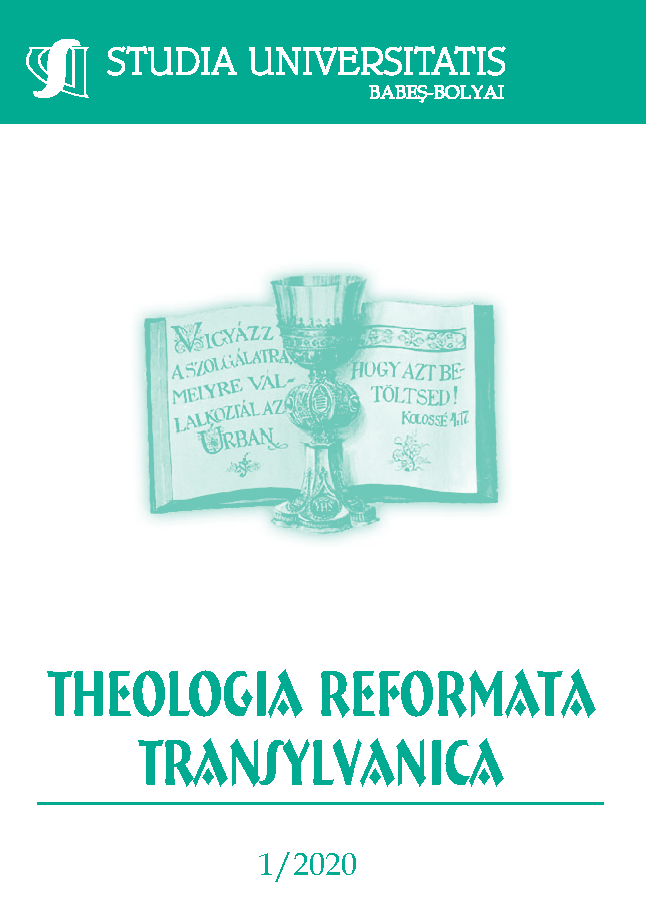Beszélhetünk-e Jézus pubertás- és kamaszkoráról? – A szülők és gyermekük közötti konfliktus feloldása a megbékélés és az egészséges személyiségfejlődés céljából a 12 éves Jézus története alapján a Lk 2,41–52 szerint –
DOI:
https://doi.org/10.24193/subbtref.65.1.15Keywords:
the 12-year-old Jesus, personality development, conflict management, family conflict, reconciliationAbstract
Can we talk about the puberty and adolescence of Jesus? – Conflict resolution between parents and their child with the purpose of reconciliation and healthy personality development based on the story of the 12-year-old Jesus according to Luke 2:41-52 −
In the altered social and family living conditions of the modern era, parents are looking for answers to the issues of raising their children and dealing with the occurring conflict situations, especially during the age of puberty and adolescence, within the second decade of the child’s personality development. The conflicts that occur during this transitional phase always cause unrest in family relations. In such cases, it is important to find ways of reconciliation, because an essential condition of healthy personality development is that the liberating power of reconciliation accompanies the system of family relations as a blessing. Parents seeking and following a Christian ethical value system also face difficulties in conflict management in these cases. Based on the story of the 12-year-old Jesus, we are looking for the power of the need for autonomy and separation from parents in Jesus’ behaviour and we also study how Mary and Joseph treated their child and the family conflict. We can conclude that in his human condition, the 12-year-old Jesus truly experienced the human phases of puberty and adolescence, and this further strengthened him to fulfil his mission and identity. The path of reconciliation on the part of Jesus’ earthly parents was completed by experiencing and demonstrating the liberating and resolution-bringing power of family togetherness, sincerity, attention, and love.
References
ATKINSON, Rita L. – ATKINSON, Richard C. – SMITH, Edward E. – BEM, Daryl J. – NOLEN-HOEKSEMA, Susan: Pszichológia, Osiris Kiadó, Budapest, 1999.
BAGDY, Emőke: Családi szocializáció és személyiségzavarok, Nemzeti Tankönyvkiadó, Budapest, é. n.
BARTHA, Tibor (szerk.): Keresztyén bibliai lexikon, II. kötet, A Magyarországi Református Egyház Kálvin János Kiadója, Budapest, 1995.
CAMPBELL, Ross: Dühöngő ifjak, Harmat, Budapest, 1997.
CARVER, Charles S. – SCHEIER, Michael F.: Személyiségpszichológia, Osiris Kiadó, Budapest, 1998.
CHAPMAN, Gary: Kamaszokra hangolva, Harmat, Budapest, 2009.
COLE, Michael – COLE, Sheila R.: Fejlődéslélektan, Osiris Kiadó, Budapest, 1998.
CULLMANN, Oscar: Az Újszövetség krisztológiája, Református Egyház Zsinati Irodájának Sajtó-osztálya, Budapest, 1990.
DOLTO, Francoise: A kamaszkor védelmében, Pont Kiadó, Budapest, 2012.
FAZAKAS, Sándor (szerk.): A protestáns etika kézikönyve, Kálvin Kiadó–Luther Kiadó, 2017.
FEUER, Mária – POPPER, Péter (szerk.): Pszichológiai műhely 9. Gyerekek, szülők, pszichológusok, Akadémiai Kiadó, Budapest, 1992.
GANÓCZY, Sándor – SCHELD, Stefan: Kálvin hermeneutikája, A Magyarországi Református Egyház Kálvin János Kiadója, Budapest, 1997.
GIDDENS, Anthony: Szociológia, Osiris Kiadó, Budapest, 2003.
HAAG, Herbert: Bibliai lexikon, Apostoli Szentszék Könyvkiadója, Budapest, 1989.
KÁLVIN, János: Evangéliumi harmónia, I. kötet, ford. Rábold Gusztáv, Grafika Könyvnyomda, Kolozsvár, 1939.
KÁLVIN, János Institutioja 1536, ford. dr. Victor János, Stichting Hulp OOst Europa, Buda-pest, 1995.
KON, I. S.: Az ifjúkor pszichológiája, Tankönyvkiadó, Budapest, 1982.
MÉREI, Ferenc – V. BINÉT, Ágnes: Gyermeklélektan, Medicina, Budapest, 1997.
MURÁNYI-KOVÁCS Endréné – KABAINÉ HUSZKA Antónia: A gyermekkori és a serdülőkori személyiségzavarok pszichológiája, Nemzeti Tankönyvkiadó, Budapest, 1988.
PIAGET, Jean – INHELDER, Bärbel: Gyermeklélektan, Osiris, Budapest, 1999.
POLLÁK, Kaim: Héber–magyar szótár, Bp. 1881.
RANSCHBURG, Jenő: A serdülés gyötrelmei, Saxum Könyvkiadó, 2011
RAVASZ, László: Az Újszövetség magyarázata, I. kötet, A Református Egyház Zsinati Irodájának Sajtóosztálya, Budapest, 1991.
SEBESTYÉN, Jenő: Református dogmatika, második kötet, Christologia, Budapesti Református Theológia Akadémiai Kurzustára, Iránytű Kiadó, 1994.
TŐKÉS, István: A bibliai hermeneutika története, A Kolozsvári Református Egyházkerület Kiadása, Kolozsvár-Napoca, 1985.
VAJDA, Zsuzsanna: A gyermek pszichológiai fejlődése, Helikon Kiadó, 1999.
VARGA, Zsigmond: Újszövetségi görög–magyar szótár, Budapest, Református Zsinati Iroda Sajtó-osztálya, 1992.
VIKÁR, György: Az ifjúkor válságai, Animula, Budapest, 1999.
Internetes források:
FABINY Tibor: A keresztény hermeneutika. http://palheidfogel.gportal.hu/portal/palheidfogel/upload/438951_1206172581_01584.pdf (megnyitva: 2020. 04. 19.)
https://szomrevalo.blog.hu/2015/01/27/egyetemes_hitvallasok (megnyitva: 2020. 04. 19.)
Downloads
Published
How to Cite
Issue
Section
License
Copyright (c) 2020 Studia Universitatis Babeș-Bolyai Theologia Reformata Transylvanica

This work is licensed under a Creative Commons Attribution-NonCommercial-NoDerivatives 4.0 International License.



